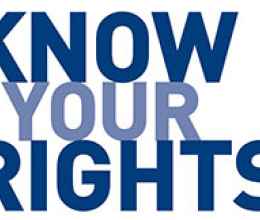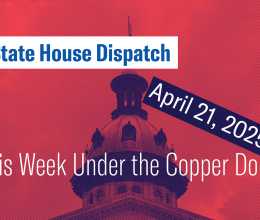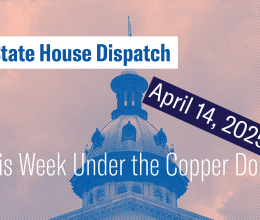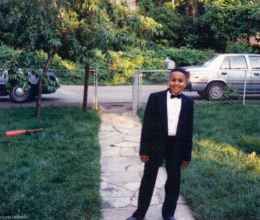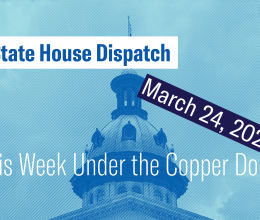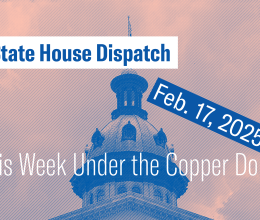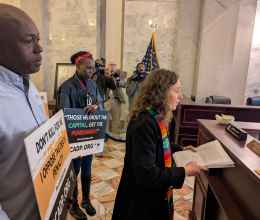By Deanna Pan & Paul Bowers
Caleb Adams is 14. No taller than 5 feet 4 inches or heavier than 100 pounds, he wears his hair slicked dramatically to one side and a silver crucifix around his neck. His parents say he's generally a good kid. But sometimes his hunger for attention leads him into trouble, as does his attention deficit hyperactivity disorder.
By the time he left C.E. Williams Middle School, he had been suspended so many times — for speaking out of turn, playing paper football with salt packets from the cafeteria, dancing in the middle of class — he said he missed more than a month of school and failed the sixth grade.
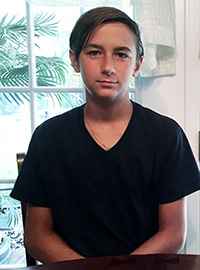
The last straw was a fight in PE class. A boy hurled a kickball at Caleb's face, and Caleb gave the kid a black eye in return. The following fall, Caleb had to repeat the sixth grade at Daniel Jenkins Creative Learning Center, a county-wide alternative school where boys and girls pass through metal detectors every day before class and teachers are trained to endure taunts, temper tantrums and a lot worse.
In the past two years, Caleb jokes that he went from “goody-good to gangster.”
Caleb and his parents say he's been arrested several times on the charge of “disturbing schools,” a misdemeanor that punishes anyone behaving in “an obnoxious manner” on school grounds and carries a higher maximum penalty than both simple assault and disorderly conduct — a $1,000 fine and a 90-day jail sentence.
The state law empowers school-assigned police officers to arrest hundreds of South Carolina students every year for the kind of adolescent misbehavior that in years past would have warranted a trip to the principal's office or a brief suspension. Its vague wording allows it to function in some cases as a catch-all for bad behavior that doesn't meet the legal standard for disorderly conduct or simple assault. When a fight breaks out in school and neither party wants to press charges, an officer can still make an arrest on a disturbing schools charge.
“It's really very difficult not to blur the line between discipline and crime,” said Susan Dunn, legal director of the American Civil Liberties Union of South Carolina. “Disturbing schools is an invitation to blur that line.”
Charleston County leads the state in disturbing schools charges. In 2014-15, the county referred 265 disturbing schools cases involving students 16 and younger to the S.C. Department of Juvenile Justice — more than Greenville and Richland counties combined.
And black students were charged at significantly higher rates than whites. While only 40 percent of Charleston County School District students are black, they accounted for 85 percent of students charged with disturbing schools between August 2014 and December 2015, according to arrest data provided to The Post and Courier by the district.
Daniel Jenkins Creative Learning Center and two predominantly black middle schools in North Charleston — Northwoods and Morningside — racked up well over a third of the district's disturbing schools charges. The youngest student arrested was a 9-year-old black girl at Burns Elementary in North Charleston.
“All we see is what comes in, and you can sit in any of our courtrooms any day and it's black child after black child,” Charleston County juvenile public defender Tamara Coppinger said. “I think the statistics speak for themselves. When it's that disproportionately affecting minority kids then something is really, really wrong.”
Still, police and school officials insist the law remains an important tool for controlling particularly troublesome and disruptive children.
“Many times you're seeing these kids that we arrest ... because we've dealt with them over and over,” said North Charleston police Lt. Kathi Love, a longtime school resource officer who now supervises SROs. “If you look at their discipline record in the schools, they had maybe 20, 30 referrals. So when is it time to stop that?”
Smoking, food fights and belligerence
In October, cellphone videos filmed at Spring Valley High School in northeast Columbia triggered debate around the country after they went viral about the presence of law enforcement officers in public schools and their role in disciplining students.
The videos showed a white sheriff's deputy violently arresting a black teenage girl for allegedly refusing to leave her math class. In the recordings, Deputy Ben Fields appears to wrap his arm around the girl's neck before tipping over her desk and flipping her out of her chair while her classmates watch in silence, mouths agape.
The girl and a classmate who filmed one of the videos of the encounter were both charged with disturbing schools. But the episode also cost Fields his job.
Across the country, states and local school districts are grappling with how to maintain school order without relying on overzealous disciplinary practices. In Virginia, Gov. Terry McAuliffe launched an initiative last year to reduce arrests, suspensions and expulsions after a Center for Public Integrity report showed his state's schools referred students to law enforcement at a higher rate than any other state. A New Mexico public school drew national rebuke in 2011 after a 13-year-old was handcuffed and detained for belching in gym class. A federal appeals court upheld his arrest last month.
Advocates of changing the disturbing schools law have blamed the lopsided arrest rates for blacks on racial bias or a lack of cultural sensitivity training for officers. Others say officers are simply enforcing the law as it was written.
“The law is being applied based on the facts of the incident, not the race of those involved,” said Charleston Police Chief Greg Mullen.
The charge is often used when a student is unruly, disobedient or gets in a fight with another student whose parents declined to press criminal charges.
In an October 2014 incident, for instance, a 13-year-old Baptist Hill Middle-High School student with a disability was arrested for being loud, cursing, refusing to hand over his cellphone and refusing to report to in-school suspension. That same month, a 15-year-old girl at Wando High School was charged after telling another student she was going to beat her up at the bus stop. She later admitted to making those threats, but said she had no intention of following through. Last year at Cario Middle School, a cafeteria food fight between two 15-year-old students led to their arrests for disturbing schools.
From schools to prison
Since 2001, more than 29,000 disturbing schools cases have routed children through the state's juvenile justice system, and about one-fifth of those cases occurred in Charleston County, according to the S.C. Department of Juvenile Justice.
Yet the law, originally enacted in 1917, was never intended to apply to students, according Jay Elliott, a Columbia attorney and former police officer who has studied the disturbing schools law for decades.
“The intent was always to protect against interlopers, trespassers, somebody who had a gripe or a grudge,” Elliot said.
Some parents and education advocates question handling kids like criminals. And while a disturbing schools arrest might not land a minor directly in juvenile detention, it can be the entry point for what advocates dub the “school-to-prison pipeline.”
“Generally we find that young students who are disciplined harshly are more likely to have negative views about their educational experience,” said Monique Dixon, deputy director of policy at the NAACP Legal Defense Fund. “They're more likely to drop out of school, to move into the juvenile justice system and to just overall have negative views about persons in authority.”
One study of Texas students found that students who are suspended or expelled from school are almost three times more likely to make contact with the juvenile justice system in the subsequent academic year. In a study of inner-city Chicago students, those who were first arrested during their freshman or sophomore year of high school were up to eight times more likely to drop out than their peers who had never been arrested.
Once a case goes to court, according to local public defenders, students will often be sent back to school with a six-month juvenile probation order. That order forbids students from having unexcused school absences or tardies, disobeying their parents' or school rules, and missing their court-assigned curfew and probation appointments — in addition to not using drugs or alcohol or committing any crimes.
The Department of Juvenile Justice monitors their probation and tracks their in-school discipline and attendance records electronically. If a student violates any of the terms of their probation, DJJ can petition Family Court for a custody order to detain the student — typically “a last resort” for students with repeated violations, according to Managing Assistant Solicitor Spiro Ferderigos, who oversees Family Court prosecutions in Charleston and Berkeley counties.
Ferderigos said the court relies on school discipline reports in forming students' probation requirements partly because discipline referrals are “a 'window' into how the juvenile is behaving in the community at large” and custody orders may be necessary to protect teachers and students.
Probation does not always encourage good behavior. Coppinger, the public defender, said some of her clients who have been marked as troublemakers by their schools become “self-fulfilling” prophecies.
“When somebody's labeling you and you're thinking of yourself and hearing of yourself that way, it has the potential to increase those behaviors,” she said. “And they probably feel hopeless in a way, like 'I'm the bad kid, I'm always going to be the bad kid.' ”
Helping troubled kids
Infiniti Campbell had brokered a shaky peace with her classmate before they walked out to the Baptist Hill bus loop at the end of the school day on Sept. 16. The two girls, both 16, had traded harsh words for days when their dispute “exploded” into a serious fight, according to a Charleston County Sheriff's Office report.
The deputy placed Infiniti in the backseat of his cruiser to cool off, but he didn't have to cuff her. He released both girls to family members with a charge of disturbing schools.
Infiniti's grandmother and legal guardian, Rebecca Campbell, said she had to pay $200 to sign her up for a juvenile pre-trial program. Infiniti had to write an essay about what she learned from her mistake, write a letter of apology to her school and serve 12 hours of community service cleaning up at a fire station. Infiniti considered it a fair outcome.
“The situation was going on for a long time,” she said. “We worked it out.”
Students who are charged with disturbing schools rarely see the inside of a detention cell. In most cases, officers release them to a parent or guardian with a court date.
Some students go to trial in Family Court. According to Love, what's more common is pre-trial intervention, which allows students to complete community service or drug counseling, which can keep them from entering the juvenile justice system.
For first-time offenders in Charleston County, police will sometimes charge a student with disturbing schools and send him or her to Youth Court, where fellow students argue the merits of the case and assign a sentence — often community service — to fit the crime.
Generally speaking, law enforcement agencies in South Carolina are leaning less heavily on the disturbing schools charge than they did at the turn of the millennium. One reason may be that it arouses so much controversy, Elliot said. In some cases, law enforcement agencies have made conscious efforts to reduce student arrests. School resource officers in the city of Charleston discuss every incident with a supervisor before making a final decision to ensure laws are enforced consistently, Mullen said.
Mullen and his counterparts in North Charleston and Mount Pleasant all said their officers have worked to establish better relationships with at-risk students through mentoring and community outreach programs. Charleston County schools also offer more help to troubled students than they used to, Love said, including mental health counseling and a new drug intervention program starting in the coming school year. But at a certain point, the law still requires an arrest.
“The schools' (hands) are tied. Many times when you make that arrest, you're forcing parents to do something. You're forcing the system to say, 'OK, this kid has done all this behavior. We've done all this to help this kid,' ” Love said. “Now they're forced to maybe see mental health. Now they're forced to go do community service to show some kind of punishment. They might be forced to go to a different school.”
'Disturbing schools' redefined
School officials have insisted they have little sway over school resource officers, who are duty-bound to enforce the law and make arrests when they see crime taking place.
But that's not always the case. School resource officers sometimes consult with assistant principals before making an arrest, and the majority of disturbing schools incident reports reviewed by The Post and Courier started with a school employee calling an SRO.
At Northwoods Middle School, which led the district with 75 disturbing schools arrests from August 2014 to December 2015, School Resource Officer Tiffani Crider said she typically doesn't intervene in student discipline until a student concern specialist, assistant principal and principal have each tried to address the behavioral issue first.
“Ninety-nine-point-nine percent of the time, I can talk to the kid,” she said. “Now if we get down there and they're still punching lockers and maybe throwing cuss words out at everybody, that's a different story.”
The Charleston Area Justice Ministry, an interfaith social justice advocacy group, has been pushing the Charleston County School District for years to address the criminalization of minority youth.
In the past year, the justice ministry gained a powerful ally at the school district in Jennifer Coker, the new head of alternative programs. She was promoted in January after years at the helm of Daniel Jenkins working with kids on the cusp of the school-to-prison pipeline.
Charleston County schools Superintendent Gerrita Postlewait tasked Coker with reviewing all of the district's disciplinary practices, and Coker came back with some radical suggestions. The first to take effect is a new progressive discipline plan, which was recently approved by the school board.
Starting in the fall, school officials will be instructed to avoid automatically suspending students for getting in fights or even for showing up to school intoxicated. Some in-school penalties have been reduced, and the district is prescribing specific punishments for first and repeat offenses to promote consistency across the county.
The new discipline plan also includes a more specific definition of “disturbing schools” — defined as “disorderly conduct or behavior that disturbs the learning environment for a significant number of students for an extended period of time” and “requires the intervention of a number of staff members.”
Postlewait supports the disturbing schools law, but she is well aware of the district's history. Since taking office last summer, she has pointed out what she calls “brutal facts” about racial disparities in the schools. She said it's difficult to pinpoint a root cause for the disparities surrounding disturbing schools arrests, but possible factors likely include an overly broad definition of the offense, limited training to ensure consistency, instances of bias and “actual differences in student behavior.”
“We must focus intently on the safety and well-being of all students and teachers and ensure reasonableness and fairness in addressing problems when they occur,” Postlewait said.
Challenging the law
Meanwhile, advocates are attempting to curb disturbing schools charges statewide. The American Civil Liberties Union of South Carolina is considering filing a lawsuit challenging the law. Dunn said other ACLU branches could issue similar challenges in other states.
“Part of the reason it's worth challenging is that it's messing up students' lives,” Dunn said. “There are things that we do with the best of intentions in the juvenile justice system that are not evidence-based and are potentially very harmful to a kid.”
In response to the Spring Valley incident, S.C. Superintendent of Education Molly Spearman launched a Safe Schools Taskforce of educators, law enforcement officials and parents charged with determining the best practices for student discipline. One of the recommendations issued by the task force calls for SRO involvement only when a student's behavior rises to the level of criminal conduct. After the task force's recommendations are approved by the State Board of Education and reviewed by the Legislature, school districts will be required to comply with them as early as the 2017-18 school year.
“We felt that as we heard from school principals and teachers that oftentimes resource officers have been asked to step in for other discipline issues,” Spearman said. “We don't want to be giving high offenses or criminal charges to students when it could have been handled as a much lower level.”
South Carolina lawmakers also proposed four bills last session aimed at reforming the state's disturbing schools statute or curbing school-based arrests, but all of them stalled in committee as the Legislature worked against the clock to pass a roads funding package and other legislation.
Two bills introduced in the House and the Senate would have clarified the disturbing schools statute to reflect its original intent by excluding students and threatening only unwelcome outsiders with arrest. A third bill would have created a restorative justice study committee charged with reviewing the state's juvenile justice laws. A fourth proposed a “cultural competency” training program for SROs along with comprehensive measures aimed at narrowing the definition of disturbing schools and restricting the role of law enforcement in school discipline.
“I could not understand why the law had morphed into something totally different,” said Rep. Mia McLeod, D-Columbia, who sponsored the House legislation aimed at amending the disturbing schools statute. “It seemed that we're engaging law enforcement to do the work of school administrators, which is to manage ordinary classroom discipline.”
At an April hearing for McLeod's bill, a representative from the S.C. Sheriffs' Association defended the disturbing schools law, writing in an email read aloud to lawmakers that the statute allows officers to charge students with “a lesser offense than, say, disorderly conduct or assault and battery.” But in fact, disorderly conduct and third-degree assault and battery both carry a lighter maximum sentences than disturbing schools under South Carolina law.
Seventh Circuit Solicitor Barry Barnette, who oversees prosecutions in Cherokee and Spartanburg counties, told legislators the law was necessary for officers dealing with misbehaving students.
“I understand the concerns about disturbing schools being too broad, but here's the problem: We don't have discipline in our schools,” Barnette testified. “There's kids that will not obey the rules, and you gotta have, you know, discretion for that officer or that person.”
“I wish it was a perfect world where the students were always well-behaved and everything,” he added. “It's not that way.”

